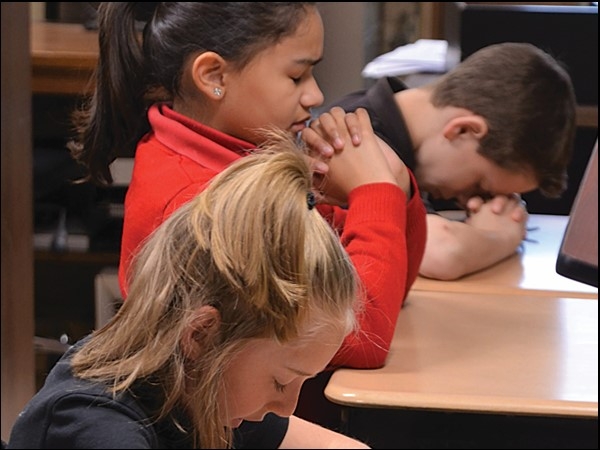Rockbridge Academy Blog
Why Do We Pray?

While I (class of 2019) was still at Rockbridge Academy, every Thursday at 11:30 AM, a half dozen high school guys would trickle one by one into Mr. Lawing’s classroom, snack on our lunches, chat for a few minutes, and then, for the rest of lunch, pray. When I happened to be at Rockbridge on a Thursday visit, I had the privilege of joining that same prayer group. I was reminded of just how precious these times of prayer are. I still consider Thursday prayer one of the best parts of my Rockbridge experience.
But prayer at Rockbridge is by no means the special province of Mr. Lawing and his Thursday prayer group. The whole life of the school is soaked in prayer. Prayer at the beginning of a school day, at the beginning of class, at the beginning of lunch. Prayer on the stage at concerts and on the starting line at cross-country meets. And of course, that tearful and joyful prayer for the seniors on their last day. From start to finish, Rockbridge is a praying school.
Why is that so? Why do we pray so much at Rockbridge? Do we believe God needs constant reminders to bless us? Do we believe He needs our suggestions to run the world? Do we believe He needs our permission to act? Or do we pray simply out of duty, uttering words into the sky with no real hope, or even desire, of an answer?
None of these are the reasons God gives us to pray. God is good, needing no reminders to bless His people. God is wise, needing no suggestions to govern His creation. God is sovereign, needing no permission to work His will. And, as we are united with Christ through faith, God is our Father. He will surely hear, and answer, His children’s requests. And this is why we pray. We pray because we want an answer. We pray because we expect an answer. This is the reason our Lord Himself gave His disciples: “Ask, and it will be given to you; seek, and you will find.” Do you want to receive? Then ask! Have you asked? Then you will receive!
It’s rarely easy, though, to live as though God really does answer prayers. Perhaps we’ve prayed for many things which we haven’t received: a test aced, a game won, a relationship restored, an ailing family member healed. How can we make sense of those apparently unanswered prayers? Were we just not praying sincerely enough? Some would say so, telling every disappointed believer to simply pray harder. But Scripture gives different counsel: God is His own master. He is not bound to grant our every wish: “He does according to His will among the host of heaven, and among the inhabitants of the earth; and none can stay His hand, or say to Him, ‘What have you done?’” (Daniel 4:35). At the end of the day, God does His will, not ours.
This is not, on the surface, the most comforting answer. What it sounds like is this: when I pray, God will give me what I ask for, but only if it happens to be what He was going to do all along. It doesn’t sound like prayer actually changes anything. And in a certain sense, that’s true. Prayer doesn’t change anything, in that neither the prayers of the saints nor the curses of demons can shake Christ from His throne or erase from His heart one word of the Covenant of Redemption. God has written His story, from “In the beginning” to “Happily ever after,” and that story cannot be changed. What we often forget, though, is that our prayers themselves are part of that story.
We can’t fully wrap our minds around it, but it’s true and vitally important. When God’s people pray and He answers them, it’s not that they happen to request the very thing He was planning to do anyway. Rather, God Himself placed that prayer on their hearts, in order that they might experience His faithfulness when He answers it. Or perhaps God’s people pray and He does not give what they ask. In that case, He placed that prayer on their hearts in order that they might experience His faithfulness by waiting. This is what happened to the Apostle Paul: he says the Lord gave him a thorn in the flesh, prompting him to pray three times for relief, in order not to take it away, but to tell him, “My grace is sufficient for you.”
So why do we pray? We pray in order that we might receive. But deeper than that, we pray that we might learn God’s faithfulness. We pray that we might learn His faithfulness the pleasant way, when He hears us and leads us through green pastures. We pray that we might learn His faithfulness the hard way, when He hears us and leads us through the valleys of deep darkness. We pray that we might learn it is by His faithfulness we live, that we might learn to rest in His faithfulness and not our own strength, that we might see His faithfulness fully displayed on that day when all prayers are at last answered.
Nathan Daly, '19, currently studies computer science and math at Johns Hopkins University.
